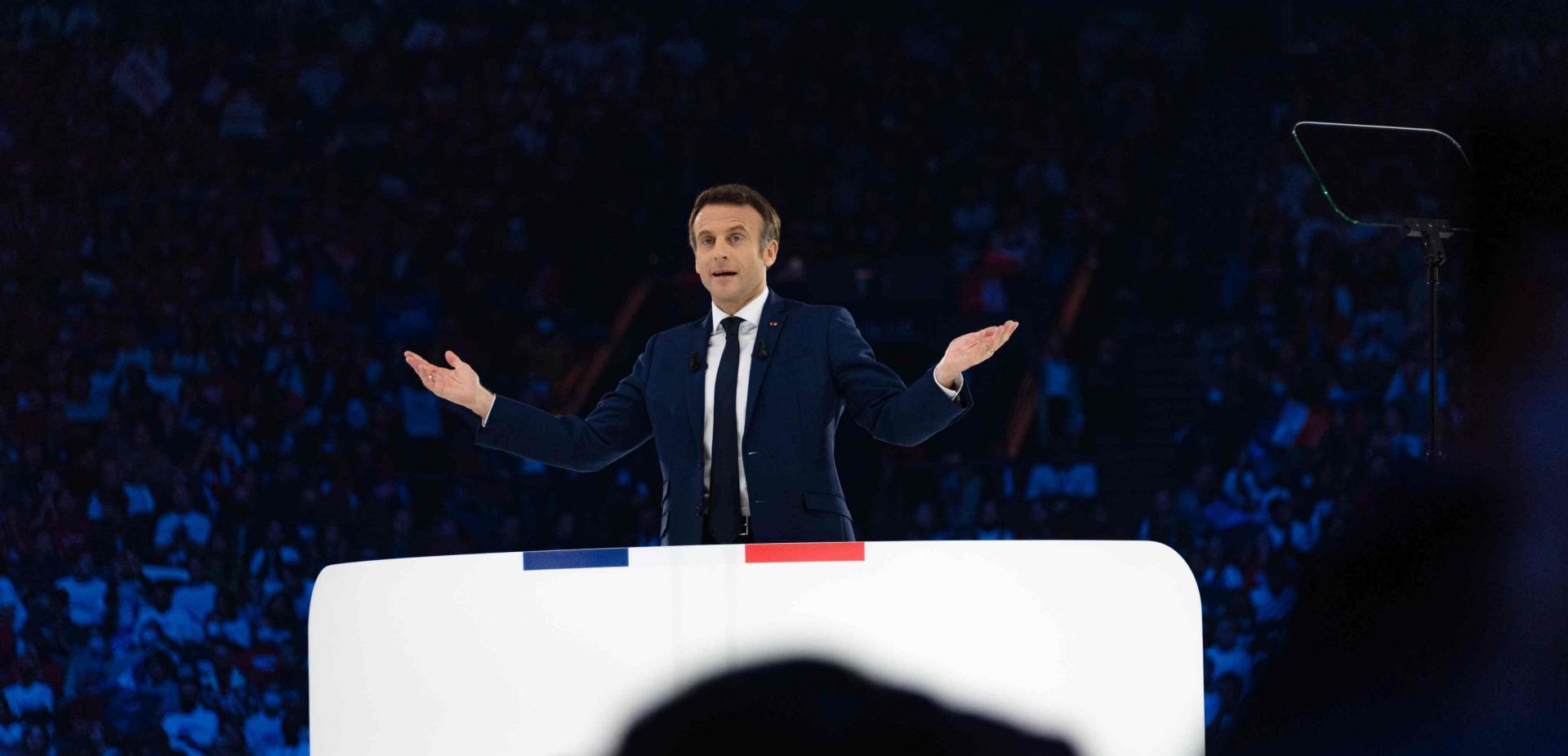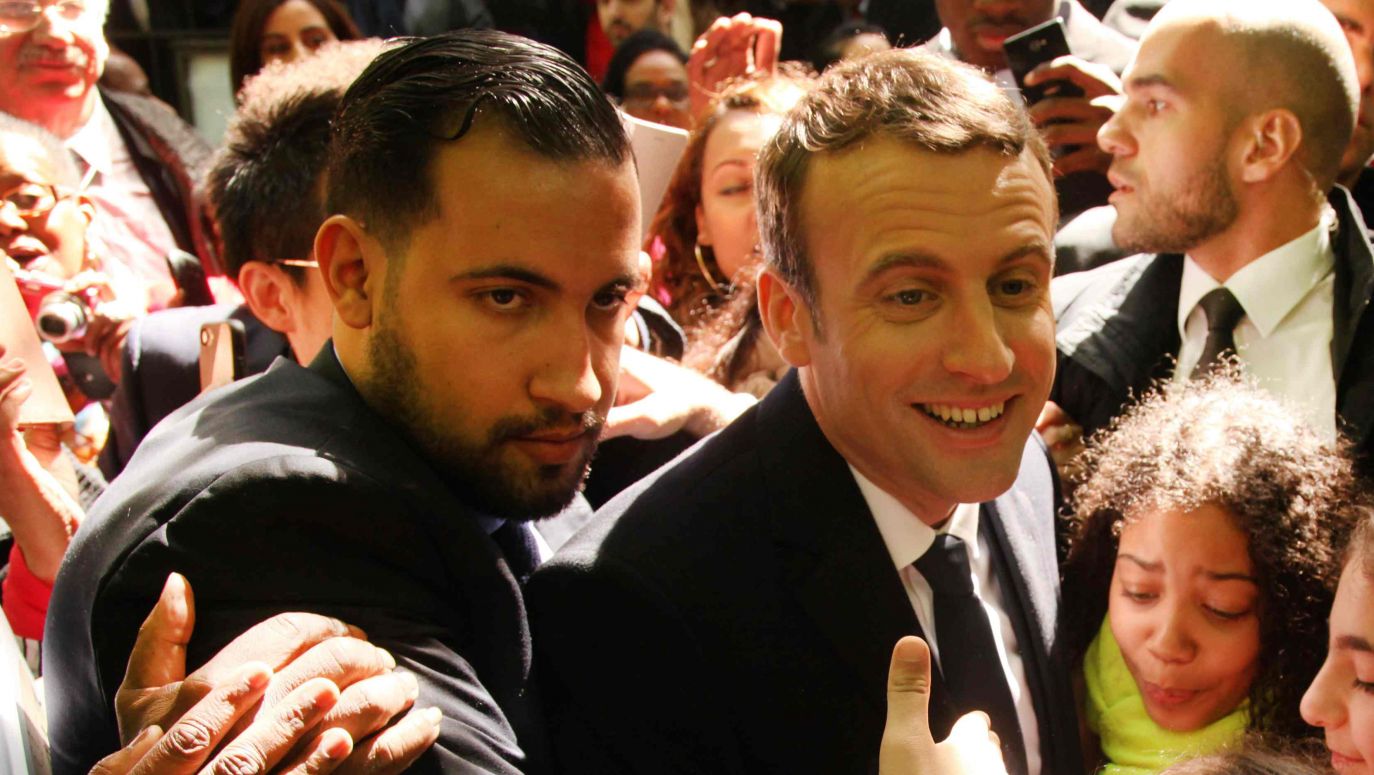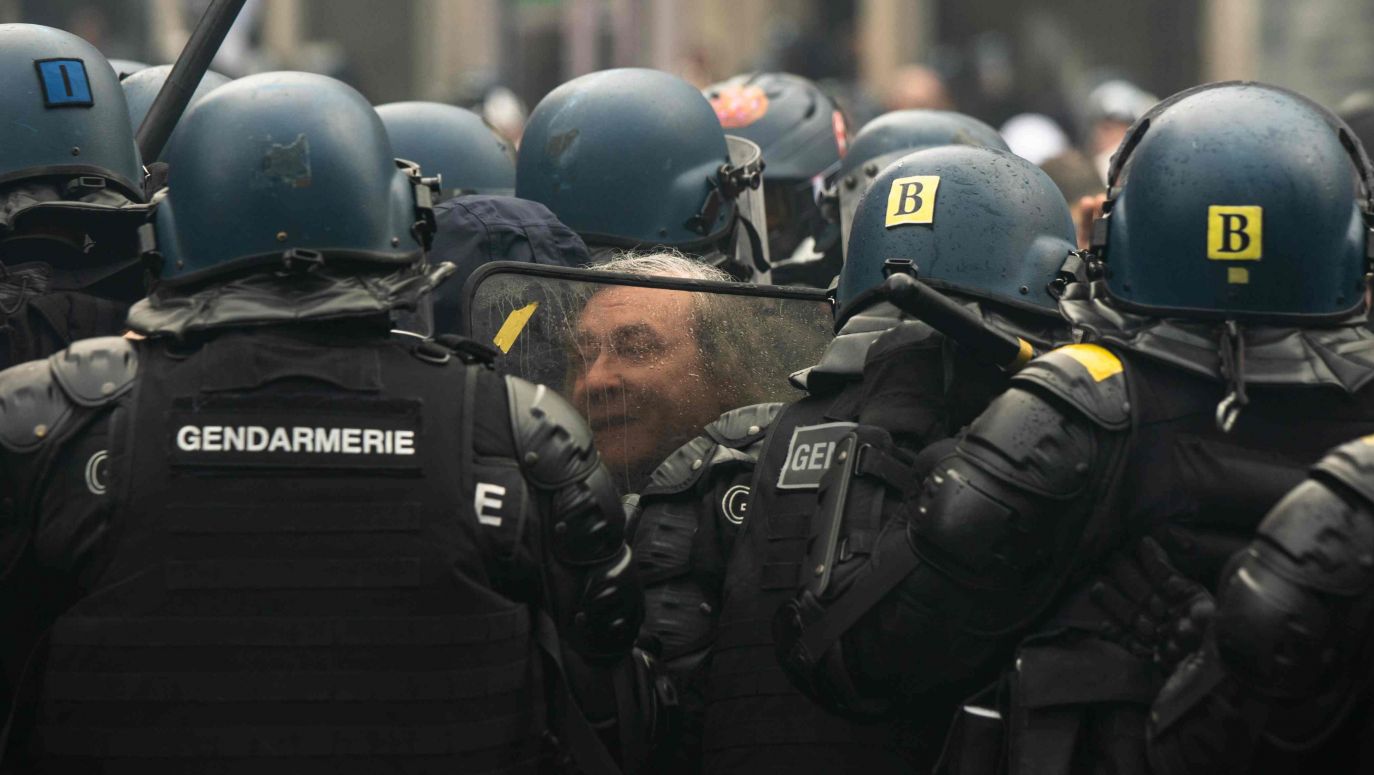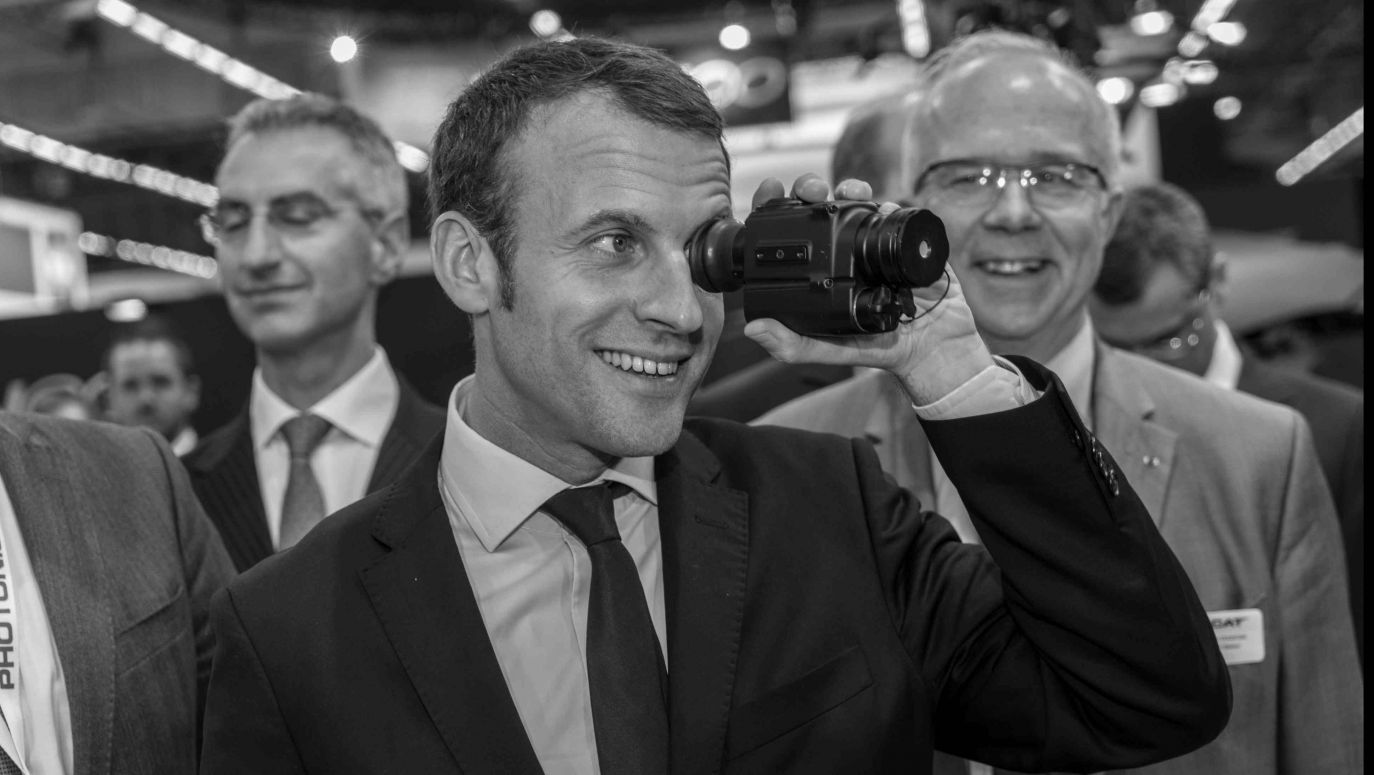Affairs, crises, scandals. Five years à l’Élysée
27.04.2022
The French elected as president a man who surrounded himself with dubious characters, allowed public money fraud in large quantities, ordered to shoot people at the Champs Élysées with smoothbore guns and made a laughing stock of nations out of a European might.
The end of a president’s term usually gives opportunity to draw a solid balance sheet. In the case of Emmanuel Macron, the summary could be the presidential debate but unfortunately on Wednesday evening his counter-candidate Marine Le Pen would prefer to focus on other issues than evaluating the last five years at the Élysée Palace and numerous scandals his presidency has been strewn with.
And there was no shortage of them. Emmanuel Macron has provided fuel for the tabloids to a greater extent than any of his predecessors. From the "yellow waistcoats", the Benalla affair, the health crises, to the ongoing conflict in Ukraine – his entire term has been full of affaires, crises and scandals. Since the media and the public have a short memory, it is worth reminding the most emblematic ones, as a fairly complete catalogue would take the volume of an encyclopaedia.
Almost a year since in office, Emmanuel Macron still enjoyed an undeserved opinion of a man from outside the system, he was believed to embody the hopes of the French, tired of the left-right political ping pong, for the renewal of political life. Unfortunately, the young president's capital of trust was severely damaged by the first major scandal at the very beginning of his term.
Scandal No 1 (with sub-scandals)
The Benalli affair had incredible repercussions and permanently damaged the image of the new president. It turned out that the new team had exactly the same vices as the previous ones, just squared.
In July 2018, the liberal daily Le Monde revealed that Alexandre Benalla, the president's bluffer and responsible for his security, appeared in a video of a May Day demonstration where he had committed violence against demonstrators alongside law enforcement troops, although he was merely an ordinary observer and was in no way authorized to participate in police operations.
Maroine Benalla, a Moroccan whose mother changed his name in office to a more French one, is a former socialist youth activist, but not in the program cell, but in the order service (the malicious will say "in militias"). More than with gray cells, he served the party with muscles, in accordance with his competences as a gendarmerie reservist with the rank of brigadier (equivalent to a corporal).
Already in the service of the president at the Elysée Palace, he will wish for - and receive - the rank of lieutenant colonel. During the development of Macron's formation, together with a contingent of young socialists joined the future president’s entourage and established friendly relations with him, which later gave rise to suspicions of various embarrassing liaisons.
In the disclosed recordings, Alexandre Benalla wore a police armband, used a walkie-talkie, and was equipped with a police helmet and truncheon, which he used with great enthusiasm. In search of strong impressions, he used the prestige of a person from the president's entourage to impose his presence at the demonstration on the prefect and the police chief as well as to have fun beating up the demonstrators. Revealing the scandal was enough to set off a real political earthquake that kept making headlines for months.
But the story did not end with this episode, and affair chased affair. Benalla was dismissed, bon gré, mal gré, by the president's office only when he illegally came into possession of the surveillance footage that was incriminating him. He was then indicted along with three other high-ranking police officers suspected of helping to illegally procure the films.
After the second episode of this series, a journalistic investigation revealed a third and many more. When Macron thought that the bombs had been defused, a scandal broke out with the diplomatic passports that Benalla was using for business trips, especially to the African continent, after leaving the Elysée Palace. He also retained other privileges: a gun permit, official apartment and limousine, parliamentary admission card, etc. Food for the media for the coming weeks…
But that is not everything. The repercussions of this scandal were so great that two parliamentary committees were set up, and when giving testimony to the Senate committee, Benalla lied so brazenly that it sparked another scandal. Moreover, as part of the investigation, the police searched the offices of ... the Elysée Palace, tarnishing the remains of the prestige of the democratic presidential aura.
Sentenced to three years, Benalla appeared regularly in the media until the end of his term of office. The last time the media wrote about him in December 2021, when he was arrested in an investigation over suspected corruption over shady dealing with post-Soviet oligarchs, especially with Uzbek billionaire Iskandar Makhmudov, linked to the Izmailov Mafia, with whom Benalla negotiated contracts while he was still working for the French president.
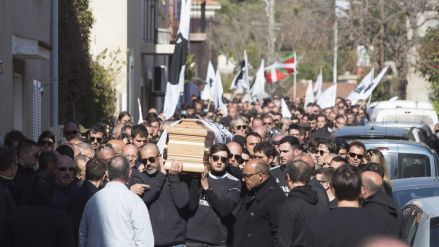
The entire Macrnistic is acting like a panicked player.
see more
Most of the time, Macron covered Benalla and exchanged text messages with him. Benalla's sense of impunity was directly proportional to the familiarity he had with the president and which gave rise to many rumours.
If this scandal resembles a sensational novel, it must have permanently tarnished Macron's image and put an end to the myth of a restorer of public life who breaks up with the abuses straight from the previous epoch.
Yellow vest crisis
Undoubtedly, no one expected the greatest crisis in Macron's tenure. On November 17, 2018, hundreds of thousands of demonstrators took to the streets after a call on social media to protest against the rise in fuel prices.
In all the cities of France, real crowds of people have appeared in protest against the tax oppression and social policies of the government. For the first time in many years, a completely grass roots and spontaneous movement was born, without the mediation of parties, unions or organizations, and thus without an official interlocutor for the authorities. There was not much of anyone to bribe, so at least some of the demands remained to be met, something rather unusual in a democracy.
Macron was forced to take some mock measures to calm the situation, such as a € 100 allowance for those receiving the minimum wage. However, among the protesters, apart from the economic ones, there were also political demands, including for civic democracy. Among them is the flagship postulate of a Swiss-style civil referendum, echoed today by the program of such "anti-system" candidates in the 2022 presidential election such as Jean-Luc Mélénchon, Marine Le Pen or Eric Zemmour. The latter's team includes two historical figures of the "yellow vest", Jacline Mouraud and Benjamin Cauchy.
However, the government did not manage to calm the mood and the "yellow vests" went out to the streets every Saturday, and the demonstrations grew stronger and began to gradually turn into street fighting so intense that on December 8, 2018, an armed helicopter was waiting in the garden of the Elysée Palace, ready for evacuate the president at any moment, should the demonstrators on the nearby Champs Elysees think to direct their anger against him more forcefully.
When the situation began to be really critical for Macron, the extreme left came to his aid. The government's greatest ally turned out to be Antifa and Black Blocs, which, step by step, began to take over what was a spontaneous protest movement close to the demands of the middle class and small entrepreneurs, this "France that gets up in the morning", according to Nicolas Sarkozy's formula, as if it was a reminiscence of poujadism from the 1950s (poujadism is a mass protest movement named after its creator and leader, whose aim was to fight etatism and the omnipotence of the state as well as resistance against the concentration of capital, social inequalities and pauperization of the middle class - editor's note)
In originally apolitical demonstrations, red flags and symbols of the extreme left began to appear, and numerous scenes of looted shops and burning barricades, especially in Paris, ones that were very media-intensive and appealing to the imagination, shocked public opinion, pushing sensible people more and more away from the "yellow vest" movement and giving the authorities a pretext for force-based solutions that were eagerly used.
The government decided not so much to suppress the movement as to use it for its own purposes, letting the police loose who were guaranteed impunity and allowed the use of defensive weapons, including the infamous LBD grenade launchers. There have been at least twelve deaths nationwide in the first few weeks, including a random woman in Marseille, killed with a tear gas grenade fired by a police officer while she was closing her apartment window. There were hundreds of injuries in the form of severed limbs or blown eyes: 353 protesters suffered head injuries, and 30 of them lost their eyesight, according to statistics by journalist David Dufresne. Practically no one was held responsible for it.
The climate of violence and confrontation - which reinforced Macron's image as an arrogant and distant autocrat - lasted for over a year, and the series of weekly Saturday mobilizations was only interrupted by the lockdown introduced in the coronavirus context.
Covid crisis
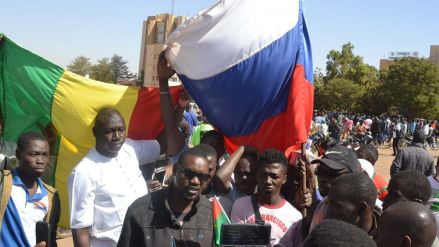
Nobody knows where the president is, there are protests in the streets and Russian flags flying.
see more
While France was shaken by the greatest social crisis since the great strikes of the People's Front (2nd half of the 1930s - editor's note), the Covid-19 sanitary crisis emerged.
Crisis management in France was not much different from that of other Western countries, and was based on the introduction of successive strict lock-ups, starting on March 17, 2020. However, the shortcomings, the incompetence of the sanitary authorities and complete indolence of those responsible for crisis management became apparent immediately.
The issue of masks became a symbol, the official discourse of which changed regularly by 180 degrees. Initially, the government called on citizens to return their stocks of masks to pharmacies, arguing that wearing them was not necessary and would not protect against the virus. Health ministry officials and media pundits regularly changed versions on the usability of masks and tests, and the then government spokesman, Sibeth N'Diaye, a specialist in making fun of herself, went so far as to admit on television that she could not wear the mask to illustrate the fact that the French should not wear masks because they do not know how to use them.
These political lies, however, were intended to conceal a completely different reality: shortage and shortage of stocks. It turned out that the strategic stock of masks was simply destroyed in order not to incur stockpiling costs. Jérôme Salomon, the country's chief physician and Macron's "Monsieur Covid", ordered the destruction of 600 million masks in 2018 and insisted on abandoning the plan to introduce a 1 billion strategic reserve masks.
Then there were the same difficulties with testing. It took a long time for the tests to be implemented on a large scale and made available to everyone in a relatively reasonable amount of time. The French had to queue for hours to be tested, and delays in receiving test results could last up to ten days. The same fiasco occurred with the introduction of vaccines.
Tens of thousands of citizens began to register complaints about the lack of foresight, multiple negligence, breach of duty of care, state lies, refusal to provide medical assistance etc., especially against the Minister of Health Agnès Buzyn.
During a hearing in June 2020 before the parliamentary commission of inquiry into pandemic management, MPs were skeptical about her explanations, and in October 2020 her home was searched as part of a judicial investigation initiated by the Court of Justice of the Republic, the only body empowered to judge members of the government performing their functions.
Agnès Buzyn who was accused of various other offenses, such as lobbying for pharmaceutical companies and a conflict of interest in appointing her husband to the position of director of the Inserm institute, escaped from responsibility by resigning in the peek of sanitary crisis under the pretext of local elections. Today she holds a comfortable position at the International Health Organization in Geneva.
It was not the only minister who could potentially end up behind bars. On the contrary - there was probably no government in the history of the Fifth Republic with so many ministers suspected or accused of various crimes, and even with court cases and convictions. It is impossible to even briefly summarize all these cases, so let the most spectacular be sufficient.
Scandals No 2, 3, and 4
Only a month after the 2017 elections were won, all ministers from the coalition centrist party MoDem were forced to resign, suspected of organizing a fictitious system of employing assistants in the European Parliament.
Hiring relatives and friends is an old practice, well-established in all parties, but usually it served only to baton Marine Le Pen. However, this time a dozen or so personalities from the Macronist coalition party have been indicted, including Justice Minister François Bayrou, European Affairs Minister Marielle de Sarnez and Defense Minister Sylvie Goulard - the future would-be European Commissioner whose compromised candidacy was insisted on by President Macron in 2019 causing another scandal.

To recognise. To talk. Perhaps, if successful, to convert.
see more
A7
The Minister of Justice, the well-known and media attorney Éric Dupond-Moretti, took advantage of his position to settle accounts with judges with whom he had conflicts when he was still an attorney. The Court of Justice of the Republic has taken up the case and is preparing the trial.
Minister Gérald Darmanin, who was accused of a much more serious crime, because of rape, got away with it. The Tourcoing resident testified that she was forced to have sex in exchange for housing and work in 2018. The case was only recently dropped but the prosecution did not prevent Macron from appointing him head of the Interior Ministry, with most feminists silent.
« Petite » scandals
Yet other Macron’s ministers forgot to complete their tax returns. Jean-Paul Delevoye, Commissioner for Pension Reform, resigned at the end of 2019 when it was revealed that he had concealed a dozen or so positions in the' supervisory boards of various bodies, associations and bodies, some of which he performed for a fee. For this, he was sentenced in December 2021 to a suspended prison sentence and a fine of 15,000 euros.
Olivier Dussopt, Secretary of State for the Civil Service, is under investigation by the Financial Prosecutor's Office for corruption and fraudulent profits for accepting gifts from a certain company. The same prosecutor's office has also been conducting an investigation into the illegal profits of Sébastien Lecorn, the minister for overseas affairs, since March 2019, in connection with his activity on the board of the motorway company.
Richard Ferrand, one of the the Socialist Party’s big shots and one of Macron's historic aides, barely appointed minister for territorial cohesion, found himself in the media's spotlight for the 2011 scandal when the institution he headed rented offices belonging to his concubine. In June 2017 Ferrand resigned, he was saved from sentence by the statute of limitations, and in September 2018 he took the position of chairman of the National Assembly, where he replaced François de Rugy ... also involved in embezzlement because of organizing sumptuous dinners in parliament for friends for public money.
Emmanuel Macron himself is not free from accusations of a financial nature. It recently emerged that in 2016, when he was still a socialist minister of the economy, making the decision to run for president, he used his position to organize lavish dinners for celebrities, in an apartment at the Ministry of Finance located over the Seine overlooking Paris and having private access from the boat. He allocated the entire representative budget of the ministry, i.e. more than EUR 120,000, for this purpose within eight months.
As a candidate and then president, Emmanuel Macron was/is required to complete an annual asset declaration. In the one from 2014, there is a fortune of EUR 156,000, and this year - EUR 500,000. These figures are surprising given that as president he made 800,000 wages in five years, and in 2009-2013, while working at the Rothschild Bank, he received a salary of almost 3 million euros, as he himself admitted (not to mention, which he did not disclose). What happened to that money? A recent investigation by the Off Investigation team casts ugly suspicions on the president's finances.
When in April 2012 Nestlé acquired a subsidiary of Pfizer dealing in the production of baby milk, it was the young banker Emmanuel Macron who convinced the management of Nestlé to sign a mega-deal worth 12 billion dollars, which earned him his famous nickname "Mozart of Finance" . It is known that the bank's fee is usually 0.5-1.5% of the transaction value, divided between the participants of the deal according to their merits. Macron should therefore earn at least EUR 5-10 million while he declared only 720,000. It is also known that thanks to the agreement with the French tax authorities, banks pay a large part of remuneration for such transactions to structures in tax havens, and only a small part in France in the form of a taxed salary.
If Macron hasn't frittered away several million euros in a few months, it means he keeps his undisclosed savings somewhere abroad.
The latest scandal. An international one
As you can see, Macron's term of office began with a scandal and it ends with a scandal. The last one, which has lasted for the entire five years, is his policy towards Russia and Putin.
There is a famous photo of Macron at the Eurosatory defense fair in 2016, at which the TopOwl alliance, the only state-of-the-art helmet sight with night vision function for fighter pilots currently in use. Why is this photo worth mentioning? Because, despite the embargo, France sold about 20 TopOwl to Russia for SU-30 pilots.
From 2015 to today, and therefore when Macron was the minister of the economy and then the president, France issued at least 76 licenses for the export of arms to Russia, for a total amount of EUR 152 million.
French companies Thales and Safran, in which the state is the majority shareholder, provided Russia with the most modern equipment, mainly thermal imaging cameras for over a thousand tanks as well as navigation systems and infrared detectors for airplanes and helicopters. This equipment allowed Putin to modernize tanks, fighters and combat helicopters used in the war in Ukraine.
In 2019, for instance, 55 Catherine XP thermal cameras were delivered to Russia, which, integrated with the tank's targeting system, detect a human or vehicle within a radius of 10 km at night. They were used in 2014 in the Donbass and are still used in Ukraine today. Safran has equipped the Migi-29 and SU-30 with the Sigma 95N navigation system, which allows pilots to locate themselves without the use of American or European satellites.
Following the disclosure of this information, the French Ministry of Defense admitted that "France allowed the implementation of certain contracts," adding that "there had been no supplies in Ukraine since the beginning of the war."
At the same time, Macron pursued a red carpet policy towards Russia. He began his presidential term with the solemn reception of Vladimir Putin at the Palace of Versailles in May 2017, an event of a symbolic dimension, as a privilege reserved for particularly cherished heads of state. The visit of the Russian autocrat coincided with the 300th anniversary of Peter the Great's visit to France, but it was rather reminiscent of the visit of Tsar Nicholas II to Paris as part of the Franco-Russian alliance of 1892
Moreover, in August 2019, Macron invited Putin to the private holiday residence of the French presidents at Fort Brégançon on the Cote d'Azur, the favorite lair of Russian oligarchs. There, he quoted Charles de Gaulle's famous formula about Europe from Lisbon to Vladivostok, which today has a slightly bitter aftertaste in the context of aggression against one of the European countries.
Macron was consistent: after the outbreak of the war, he encouraged French companies not to leave the Russian market too hastily. How funny it sounds in this context to threaten that "Russia will pay a large price" for an attack on Ukraine. How grotesque it is to call the Kremlin in an empty gesture by unwanted diplomacy...
Each of such scandals should theoretically destroy the president's chances for re-election, or at least take a few points from the polls. However, for mysterious reasons in France, they have no effect on the result and next Sunday the French will send to the Elysée Palace a man who surrounded himself with dubious characters, allowed public money fraud in large quantities, ordered to shoot people at the Champs Élysées with smoothbore guns and made a laughing stock of nations out of a European might.
Every francophile's heart is now bleeding…
–Adam Gwiazda
–Translated by Dominik Szczęsny-Kostanecki
